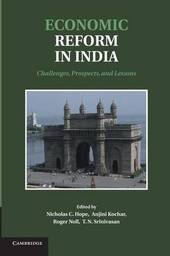
|
Economic Reform in India: Challenges, Prospects, and Lessons
Paperback / softback
Main Details
| Title |
Economic Reform in India: Challenges, Prospects, and Lessons
|
| Authors and Contributors |
Edited by Nicholas C. Hope
|
|
Edited by Anjini Kochar
|
|
Edited by Roger Noll
|
|
Edited by T. N. Srinivasan
|
| Physical Properties |
| Format:Paperback / softback | | Pages:546 | | Dimensions(mm): Height 229,Width 152 |
|
| Category/Genre | International economics
Development economics
Political economy |
|---|
| ISBN/Barcode |
9781107436800
|
| Classifications | Dewey:338.954 |
|---|
| Audience | | Professional & Vocational | |
|---|
| Illustrations |
120 Tables, unspecified; 40 Line drawings, unspecified
|
|
Publishing Details |
| Publisher |
Cambridge University Press
|
| Imprint |
Cambridge University Press
|
| Publication Date |
21 August 2014 |
| Publication Country |
United Kingdom
|
Description
The essays in this volume are written by leading economists working on the Indian economy. They collectively emphasize the importance of policies and institutions for sustained growth and poverty reduction, stressing that the success of sector-specific policies is vitally dependent on the nature of markets and the functioning of institutions such as those charged with regulating and overseeing critical sectors. Individual contributions assess the role of Indian government policy in key sectors and emphasize the policies required to ensure improvements in these sectors. The first section discusses aspects of the macro economy; the second deals with agriculture and social sectors; the third with jobs and how labor markets function in agriculture, industry and services; and the fourth with infrastructure services, specifically electricity, telecommunications and transport. The essays are drawn from the most influential papers presented in recent years on Indian economic policy at the Stanford Center for International Development.
Author Biography
Nicholas C. Hope has served as Director of the Stanford Center for International Development at Stanford University since 2007; from 2000 to 2007 he was the Center's Deputy Director. Dr Hope joined the World Bank in Washington DC in 1977 and held positions through 2000 as chief of the external debt division, chief of the industry and energy division for Indonesia and the Pacific Islands, country director for China and Mongolia, resident director in Indonesia, and director in the office of the vice president for Europe and Central Asia. He co-edited two volumes in 2003 and 2008 on Chinese policy reform. Dr Hope received his Ph.D. from Princeton University. Anjini Kochar is Senior Research Scholar and has served as India Program Director at the Stanford Center for International Development since 2000. From 1990 to 2000 she was an Assistant Professor in the Department of Economics at Stanford University. Her research has concentrated on poverty and rural development in India, and has appeared in the Journal of Political Economy, The Review of Economics and Statistics and The American Economic Review among other publications. Dr Kochar is also an associate editor of Economic Development and Cultural Change. Her Ph.D. in economics was awarded by the University of Chicago. Roger Noll is Professor of Economics Emeritus at Stanford University and Senior Fellow at the Stanford Institute for Economic Policy Research. Previously, he served as a Senior Economist at the President's Council of Economic Advisors and as a Senior Fellow at the Brookings Institution in Washington DC, and as Institute Professor of Social Science, California Institute of Technology. Professor Noll has published 14 books and written more than 300 professional articles on technology policy, regulation and privatization, and the political economy of public policy and public law. He has been a member of numerous federal and state commissions and advisory boards. T. N. Srinivasan is Yong Pung How Chair Professor at the Lee Kuan Yew School of Public Policy, National University of Singapore, Samuel C. Park, Jr Professor of Economics Emeritus at Yale University and a former visiting fellow at the Stanford Center for International Development. The author and editor of numerous books and professional articles on world trade, development economics and econometrics, he is a fellow of the Econometric Society, the American Academy of Arts and Sciences, the American Philosophical Society and a foreign associate of the US National Academy of Sciences. He received the Padma Bhushan decoration in 2007 from the President of India for his contributions to literature and education.
Reviews'The transformation of India in the past couple of decades from a slow growth economy to the ranks of the fastest growing economies in the world is not a mystery. Economic reforms unleashed the growth potential of the sleeping giant. But what exactly were these reforms? This volume, with contributions by an all-star cast of expert economists, is the definitive description of the wide-ranging economic reforms undertaken by the Indian government. It will be read by academics with an interest in growth and the Indian economy, as well as by policy makers around the developing world who want their countries to emulate the Indian experience.' Mohsin Khan, Rafik Hariri Center for the Middle East, Washington DC 'This is a comprehensive critical analysis of economic reforms in India in various important sectors of the economy. The contributors to the volume are well-known scholars on Indian economy, and in this volume they not only make lucid and critical analysis of the reforms undertaken so far but also underline the unfinished tasks. The book is a must-read for students, scholars, and policy makers of Indian economy alike.' M. Govinda Rao, Director, National Institute of Public Finance and Policy, New Delhi
|